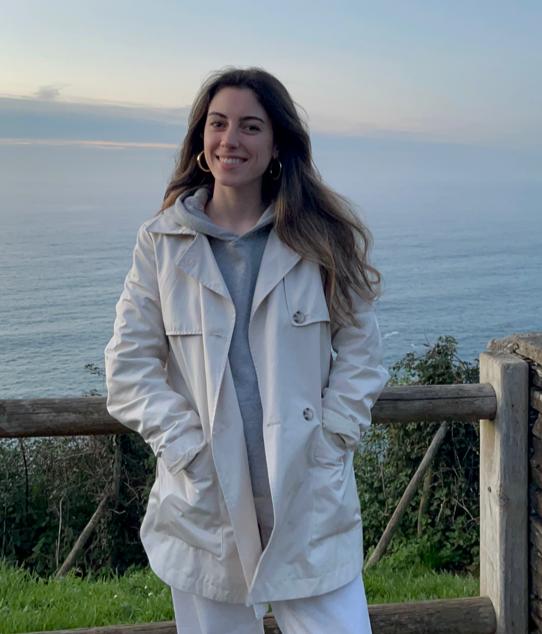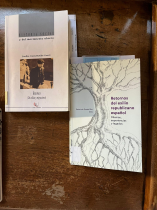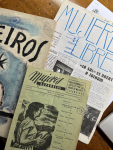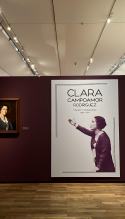Maria medin-Doce
PhD candidate, Department of Hispanic Languages and Literature
Guiliano Fellow, Spring 2022
Representations of homemaking and affect in 20th century Spanish women's literature (Madrid, Spain)
On Saturday, October 8, I arrived at Barajas airport in Madrid, ready to begin my first research trip. Although I had been to this city before, I had never been alone and never had the need to familiarize myself with the streets and avenues. As a tourist one feels the freedom of being able to get lost, but in those days that I was going to stay I could not afford the luxury of tasting that feeling of not measuring time. In one week I managed to establish a little routine, learning routes to visit bookstores, and how to get from my airbnb to the library. I used the first two days to visit certain important bookstores. Madrid is not only the capital of Spain, but also in cultural terms it is the capital of the movement. The city has numerous cultural spaces, and huge bookstores in which I was able to find sections explicitly related to the literary period and theme I am studying in my project: 20th century and republican exile. Some of the bookstores I visited were: La Central, Librería de mujeres, La casa del libro, and Librería La Mistral.
The following days were spent at the National Library, where I had reserved certain documents to read and review. From my visit to the BNE (Biblioteca Nacional de España, or National Library of Spain) I was able to profit from the following: I read two books related to the topic of the republican return, which is having some prominence in my dissertation: Retornos (de exilios y migraciones) coordinated by Josefina Cuesta, and Retornos del exilio republicano español: dilemas, experiencias y legados edited by Aránzazu Sarria-Buil.

These two books present an extensive corpus of essays produced from 1999 to 2019 that deal explicitly with the return, or possible return, that took place at the end of the twentieth century in Spain. They point out possible and necessary lines of research and explain the importance of continued discussion on this topic, which is still not as well studied as others related to this context. Therefore, my research has been inspired by coming into contact with certain essays, such as “Informe de un regreso” (Report of a return) by Antonio López Campillo, who points out that “Every return is an adventure. And the return from exile is something more than a personal anecdote” (415, my translation). By stating the above, possible interpretations of what ‘return’ mean can appear based on the different experiences that took place. Accordingly, my study intends to focus on some of these possible interpretations offered by literature, mainly produced by women (novels, short stories, essays, the epistolary genre, etc.) in order to understand how and why the returns took place, and what we can take from this reflection to build an understanding of the problematic of feeling and having a home at that time. Many of these essays point to a thought with which I agree, and that is that the return is always fictitious, it is never real because when a subject leaves their origin, and is gone for so long, when they return nothing is as it was. Nothing is the same as it was when they left, and therefore one wonders where is the familiarity of the space, and the sense of belonging. If familiarity has been lost, then one arrives at a new space, and therefore, where has the home been left?

Other documents I had the opportunity to review were women's magazines that came out during the civil war and the dictatorship. The case of the magazine Mujeres Libres has been very relevant in shaping my ideas about the home. This magazine revisited the dominant hegemonic and sexist philosophy in early 20th century Spain in order to launch a feminist critique on issues such as: the right to abortion, the possibility of non-domestic work for women, the right to divorce, women as intellectuals, the necessary union among women to create networks of dialogue, etc.
Finally, there is another magazine that can potentially enter into dialogue with my project: Vieiros. This magazine is organized by a group of Galician exiles in Mexico, and functions as a point of cultural contact in exile. This is significant because it points to the fact that these cultural and literary encounters are part of the pillar raised in exile in order to transfer the culture of the peninsula to the new space in which they find themselves. It is, in my opinion, a possible creation of a cultural home, with the purpose of not losing that very characteristic identity; customs, thoughts, ways of being, language, etc. abroad.

In addition to working with these archives, I had the opportunity to visit the exhibition they had in the library about Clara Campoamor. The exhibition collected a series of relevant data about this woman, putting together a visual biography and a tour of the ‘feminist-Spain’ of that time. Campoamor is well known for her political role and for being one of the driving forces of the feminist movement in Spain, as she was one of the main promoters of wome’s suffrage.
Overall, my visit to Madrid has been very productive, as I have come into contact with certain issues through the documents I read that helped me to better fix my lines of research. My study, in its entirety, provides a space in which to continue thinking and constructing the history of the Spanish Republican exile, from all its vertices, paying attention to those scenarios that in some way have shaped a stealthy experience of this historical period. That is, experiences that even today are not known, are not discussed, and deserve to be explored, such as I could observe by reading some literature in the BNE, the topic of the return. Additionally, there is still, I believe, much reflection to be done on the difference between the concepts of house and home for those who lived that particular experience of exile.
The Guiliano Global Fellowship Program offers students the opportunity to carry out
research, creative expression and cultural activities for personal development through
traveling outside of their comfort zone.
GRADUATE STUDENT APPLICATION INFORMATION
UNDERGRADUATE STUDENT APPLICATION INFORMATION
Application Deadlines:
Fall deadline: October 1 (Projects will take place during the Winter Session or spring semester)
Spring deadline: March 1 (Projects will take place during the Summer Session or fall semester)
Please submit any questions here.
